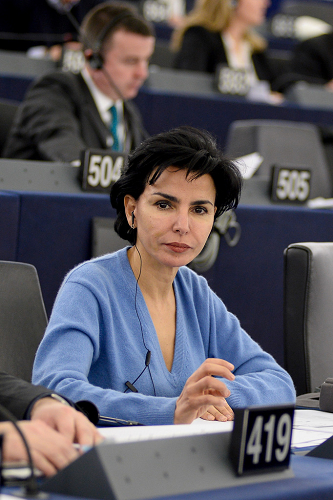Rachida Dati on the radicalisation of EU citizens: "A truly European response is needed"
An estimated 5,000 European citizens have joined terrorist organisations fighting in Iraq and Syria. With the issue of foreign fighters posing challenges for governments across the EU, a report on preventing the radicalisation and recruitment of European citizens by terrorist organisations will be put to a vote in the civil liberties committee on October 19.

Interview with Rachida Dati
The fight against terrorism remains a core competence of the member states, why is a European approach needed today?
Over the past two years, terrorist attacks carried out by radicalised European citizens have taken place in a number of countries. There are hotbeds of radicalised Europeans across the Union, and due to the Schengen area EU citizens may travel freely.
We are thus facing a threat which impacts on all of us, and this is why a truly European response is needed. This need not mean fewer competences for member states but simply more coordination and collaboration.
Your report addresses the prevention of radicalisation, what are the measures you propose?
For a very long time our policies have not been proactive. We also need to be forward-thinking, by pushing our own counter-arguments against those of online terrorists, prosecuting the internet giants to push them to delete illegal content, segregating radicalised inmates in prisons, engaging in dialogue with the various religious communities, preventing radicalisation through education and tackling terrorism-funding channels by guaranteeing greater transparency on external financial flows.
According to your report the internet is one of the primary channels of radicalisation. We know that a lot of personal data is already gathered online, should we go further with this?
It is less an issue of adopting new surveillance measures than of properly implementing those already in place and, above all, exchanging the information we have with our European partners.
The biggest problem with the internet is the publishing and proliferation of illegal content. The internet giants must accept their responsibility. Should they refuse to cooperate or show themselves willing, I propose that they face criminal charges.
Source: European Parliament
- 322 reads
Human Rights
Ringing FOWPAL’s Peace Bell for the World:Nobel Peace Prize Laureates’ Visions and Actions

Protecting the World’s Cultural Diversity for a Sustainable Future

The Peace Bell Resonates at the 27th Eurasian Economic Summit

Declaration of World Day of the Power of Hope Endorsed by People in 158 Nations

Puppet Show I International Friendship Day 2020

